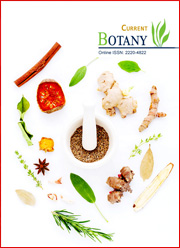Effect of Silver Ions on Ethylene Metabolism of Mustard Grown Under Irrigated and Non- irrigated Conditions
Abstract
A field experiment was conducted during the winter season of 2004-2005 at the Experimental farm of Aligarh Muslim University, Aligarh, India on mustard (Brassica juncea L. Czen and Coss, cultivar Alankar) under irrigated and non -irrigated conditions to evaluate the application of 0 and 200 µl/L ethrel (E200) or 1 mM silver thiosulphate (S) at flowering stage along with a basal uniform application of 80 kg N ha-1 on leaf area, plant dry mass, net photosynthetic rate and seed yield. Silver thoisulphate, which inhibits the physiological action of ethylene was used in the experiment with ethrel. Ethrel is a source of ethylene and its effects are manifested through physiological action of ethylene. Ethrel 200 µl/L (E200) treatment enhanced leaf area, net photosynthetic rate, plant dry mass and seed yield by 10.6, 9.1, 7.7 and 11.6% over S treatment. So silver thiosulphate (S) reduces the physiological action of ethrel (source of ethylene) in this study. This clearly indicates that silver ions used in this experiment in the form of silver thiosulphate inhibits the action of ethylene metabolism in mustard.





 .
.